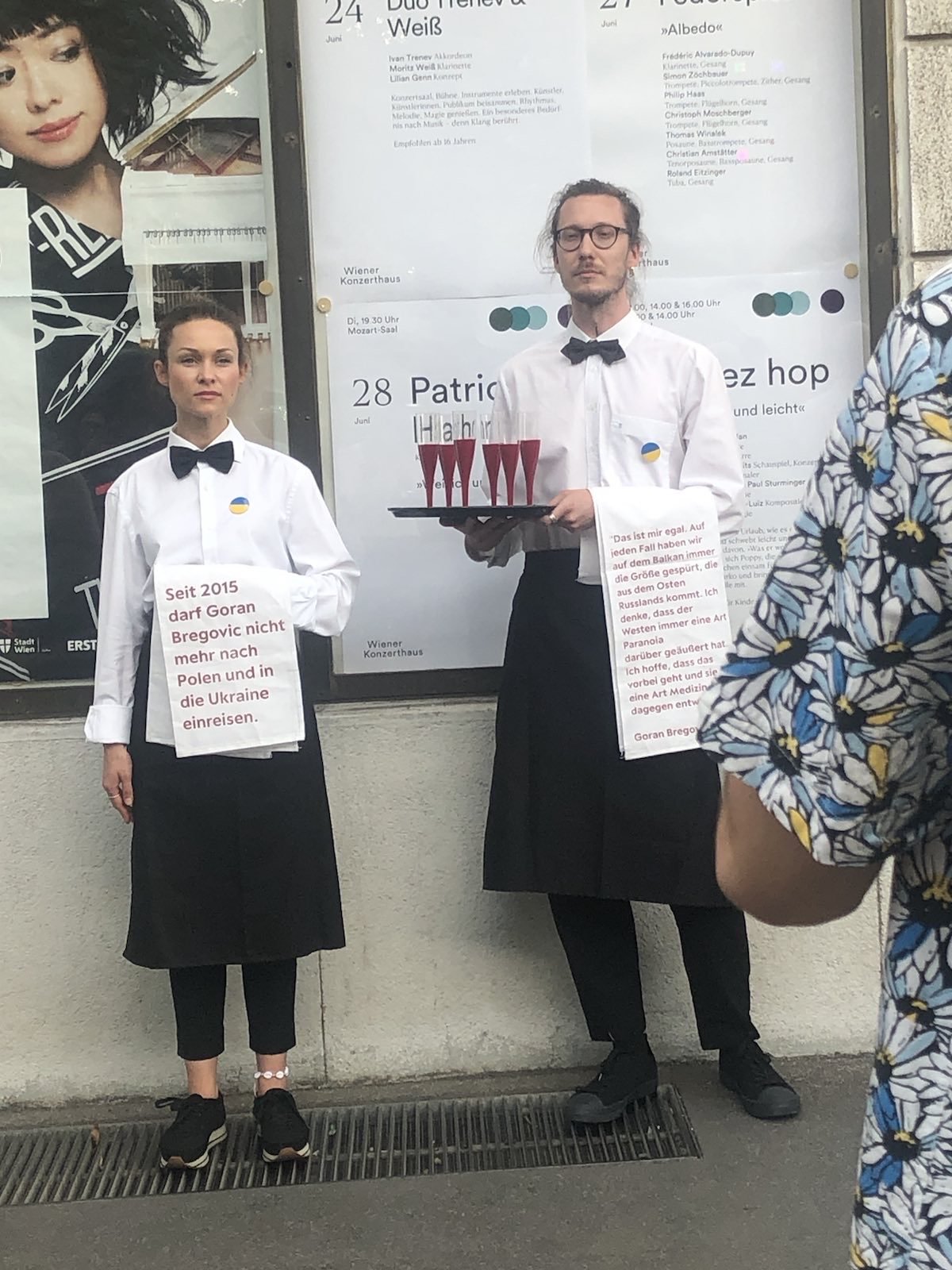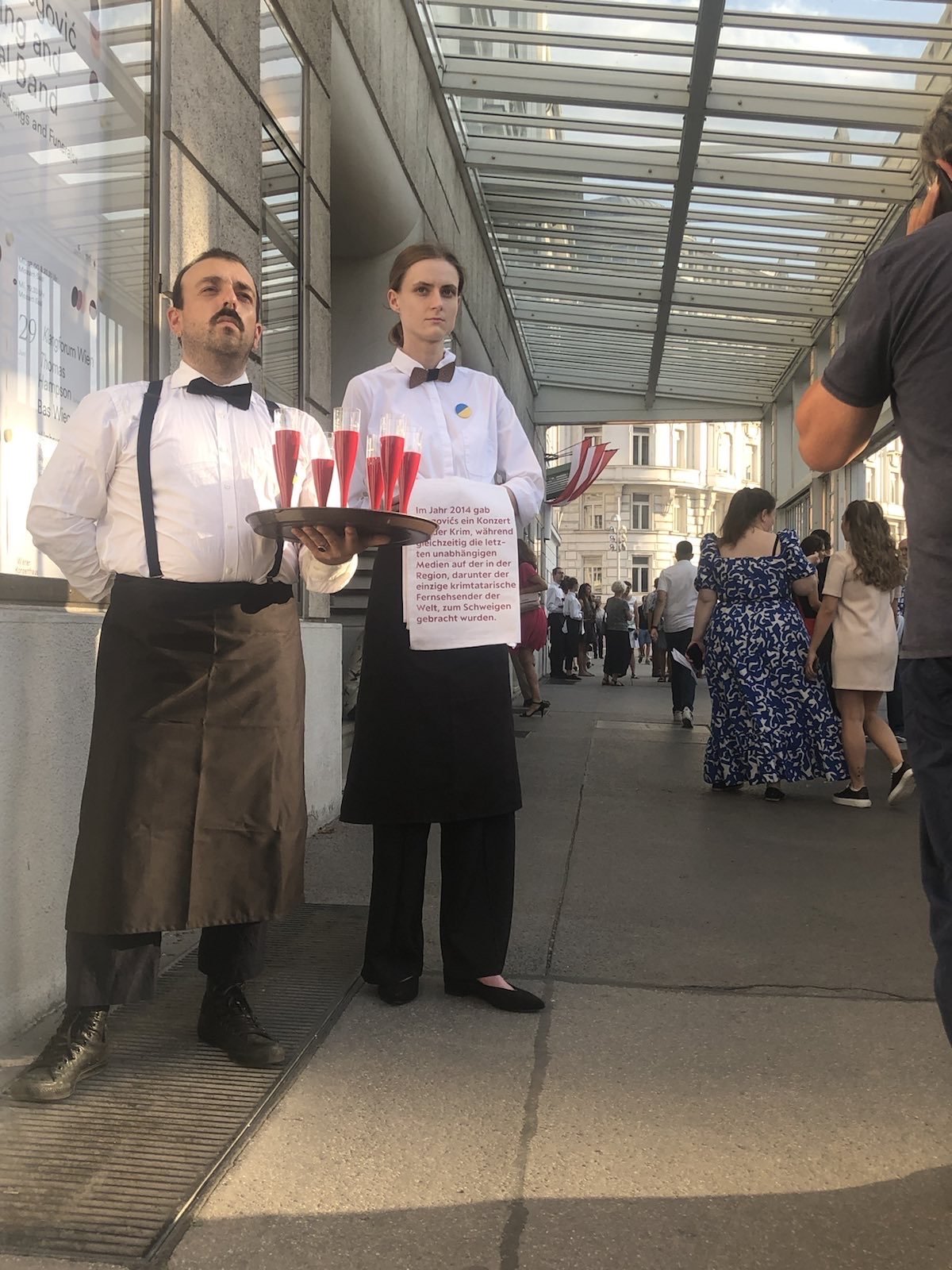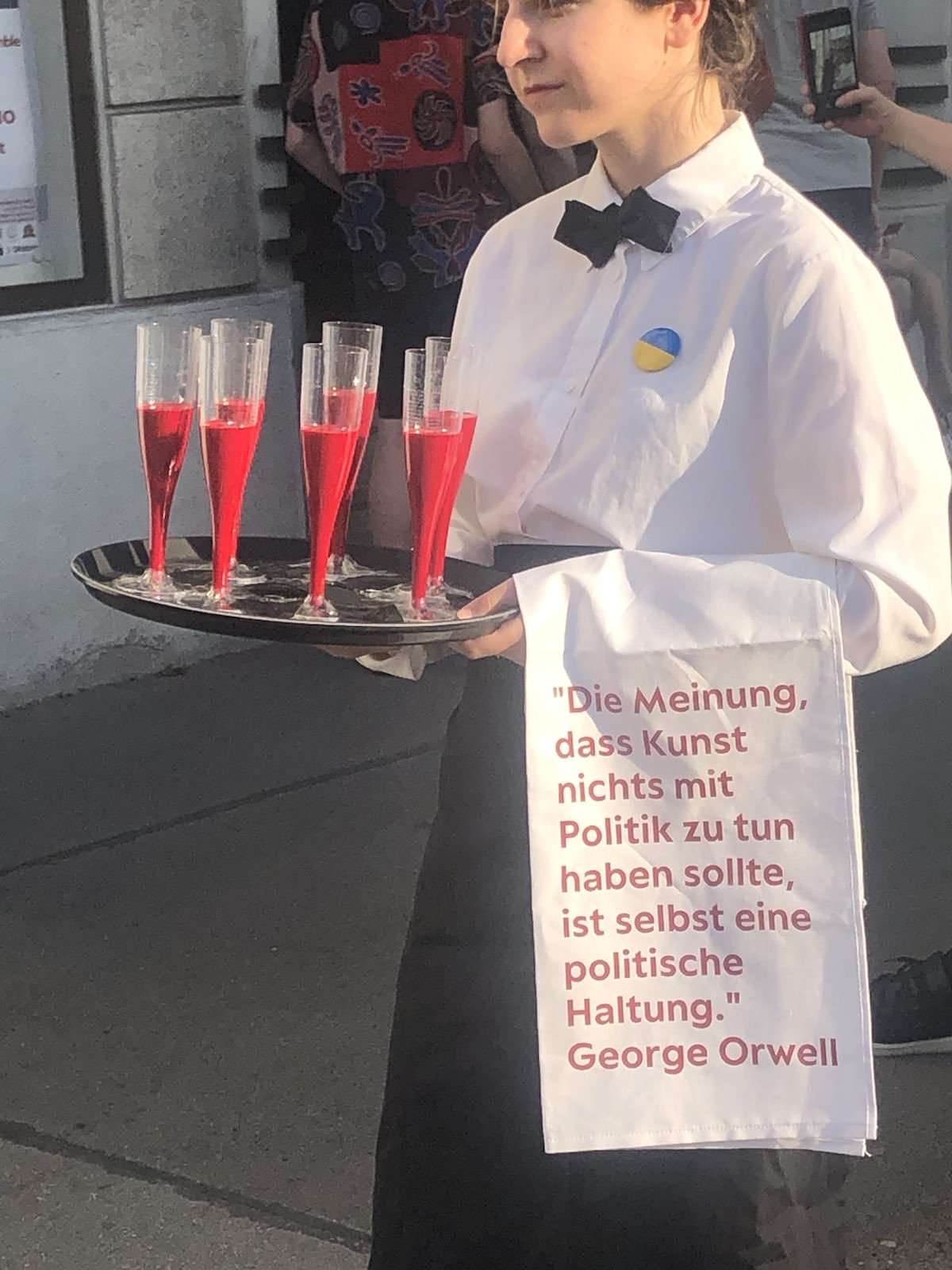BLOOD CATERING
—by Úla Šveikauskaité
On the 24th of February, Russia started a full-blown war against Ukraine, yet the cultural sector of Austria still tries to pretend that art and politics have nothing in common. When this vague statement could be applied in some situations, it definitely couldn’t be in the case of Goran Bregović, a Bosnian musician and composer who repeatedly expressed his admiration for the regime in Russia and showed an arrogant disregard for both international law and the lives of Ukrainians by performing and cheering for Russians in an annexed Crimea in 2015. After he received some criticism regarding the choice to tour in a Russian-occupied territory despite the European sanctions, he replied: “I don’t care. At any rate, in the Balkans, we have felt the greatness that comes from the east from Russia. I think that the West has always expressed some kind of paranoia about this. I hope it will pass and they’ll come up with some kind of medicine against it.”
Now, since the conflict in Ukraine shifted from the hybrid to conventional war, most of the European countries have expressed their solidarity with the Ukrainians through huge demonstrations, sanctions, military help and humanitarian aid. However, in the light of current events, Wiener Konzerthaus still hosted Bregović’ show on the 24th of June. We think promoting a performer who sympathizes with Russian imperialism in such a terrible time for Ukrainians is an ignorant and cynical move. That is why on the 24th of June at 19:00, we gathered in front of Wiener Konzerthaus for a silent protest/happening/artistic performance, “Blood Catering”.
The idea was to organise a performance targeting the usual audience of the Wiener Konzerthaus—not overly exaggerated but still “in your face”. The action was a subtle mockery of Viennese catering companies, usually serving champagne to guests before concerts. Six of us were dressed as catering waiters (white shirts, black bow-ties, aprons etc.) with the pins of the Ukrainian flag on the shirt. Some of us were holding trays with glasses filled with fake blood. This was meant as a metaphor to say: “While you are enjoying the cultural act from the performer which used to praise totalitarian Russia in the past, Ukrainians are paying for it with their lives”. Others were holding white towels with printed statements and quotes such as:
“I don’t care. At any rate, in the Balkans, we have always felt the greatness that comes from the east of Russia. I think that the West has always expressed some kind of paranoia about this. I hope it will pass and they’ll come up with some kind of medicine against it.” Goran Bregović
In 2015, in spite of serious human rights violations by the occupation regime in Crimea and international sanctions, Serbian musician Goran Bregović held a concert in Sevastopol where he praised Russia’s greatness and expressed hope that the West would be “cured of its paranoia”.
Since 2015, Goran Bregovic has been banned from entering Poland and Ukraine.
In 2014, Bregović’ concert was held, while the last independent media in Crimea, including the only Crimean Tatar TV channel in the world, were being silenced.
“The opinion that art should have nothing to do with politics is itself a political attitude.” George Orwell
A couple of us were interacting with the concert guests and one was filming and taking pictures.
Since we organised a protest of such a kind for the first time, naturally, I was quite nervous about how it will go. But after being a bit uneasy in the beginning, later on, I was eager to see the reactions of people. Our clothes looked so smart that probably from far away, it seemed like we were just serving the drinks. A happy Konzerthaus visitor would come closer, but after seeing the Ukrainian badges and the “blood”, his smile would turn upside down. Some people would take pictures; some would express annoyance and a couple of them even voiced some pro-Russian views. One passenger asked our colleague who was filming, “What is happening here?” in Russian. Given the answer, she said: “You are going against yourselves. The victory will be ours, you will see”. In such moments you want to come up with a clever response but after such “majestic” words, you can only look and wonder.
On the contrary, the majority of guests were polite and civil. One concerned man told me:
“But you know that Bregovic is not a nationalist.”
“Might be, but he has a past in which he chose to play in Crimea right after it was occupied and organised a performance in Sevastopol shortly after where he was praising the “great Russian culture”. In the light of current events after such controversies making no statement is a statement in itself.”
“Maybe he will tell his statement on the stage”, a woman next to us replied.
“I really hope so.”
As far as it was written in the press, no statement was made, but instead, Bregović triumphantly ended his show with song “Kalashnikov”. Art and politics should be, of course, separate, right?
Our biggest gratitude goes to the policeman who was in charge of everything going smoothly and was very friendly in general. He told our catering team we were the most stylish protest he had ever seen. Also, big respect to the man who, after talking to us, decided to return his ticket.
However, it is not about canceling the artist. Despite the fact that Bregović is an excellent musician and his songs are truly energising, one needs to see the full picture. Our action was meant to create the dialogue and show this personality's darker side.. Whether to consume such a culture or not is a personal choice, but it needs to be made knowing the full context.
The protest “Blood Catering” was a subtle way to disturb the illusionary thinking that inviting Russian regime-friendly artists have nothing to do with politics. It was a call to the Wiener Konzerthaus to take a clearer moral stance and to emphasise rather with the victim than the oppressor.
Photo and Video: Justina Špeirokaité
Postproduction: Miloš Vučićević




